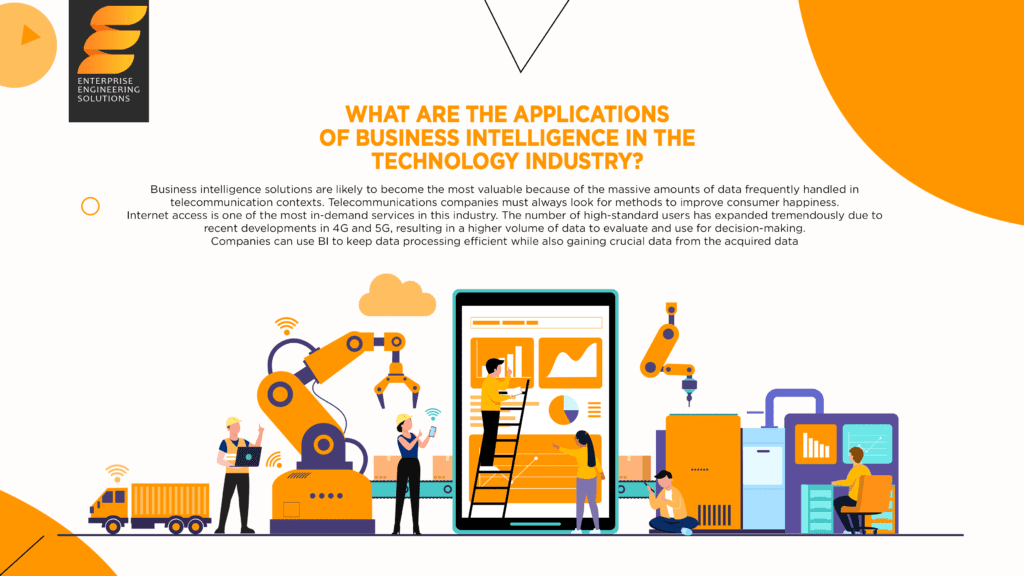Business intelligence causes considerable transformation in the technology industry (TI) because tech-related businesses utilise BI to bring solutions based on massive databases.
How can Business Intelligence help the Technology Industry?
The benefits and uses of BI in the technology industry include the followings:
Data Accessibility
Business intelligence software allows for quick and accurate access to various data sources and reporting. This assists IT firms by making it faster for them to deal with data stored in databases across all sectors and departments.
Scalability
This is among the most critical aspects sought by technology industry organizations, which business intelligence services fully address. It refers to a system’s ability to expand its work capacity (number of users, queries, etc.) instead of sacrificing speed. Regardless of the number of concurrent users, the platform will function properly.
The technology industry and BI can improve their mobile capabilities and local and remote access.
Security
Data security is critical for all companies in the technology sector. One of the essential business intelligence applications is security systems, which allows firms to maintain tight control over their data and provide access privileges to individuals based on their needs and behaviors. This feature of business intelligence services also enables firms to defend themselves against cyberattacks from internal and external sources, independent of their origin.
Integration
Many technology industry organizations may already have information and resources saved in databases before they begin employing business intelligence. However, this would not be an issue because the technology industry and BI solutions are developed for various technological infrastructures and link into the systems these firms now work with.
What are the Applications of Business Intelligence in the Technology Industry?

Telecommunication:
Business intelligence solutions are likely to become the most valuable because of the massive amounts of data frequently handled in telecommunication contexts. Telecommunications companies must always look for methods to improve consumer happiness.
Internet access is one of the most in-demand services in this industry. The number of high-standard users has expanded tremendously due to recent developments in 4G and 5G, resulting in a higher volume of data to evaluate and use for decision-making.
Companies can use BI to keep data processing efficiency while also gaining crucial data from the acquired data.
Industry 4.0:
Companies in this area use BI tools to enhance their business processes. Studying various data to make effective selections in the corporate realm is vital. As a result, business intelligence is used in the industry 4.0 sector to improve manufacturing quality standards. This enables early diagnosis of potential problems. Defects in products, for example, can be found by examining factors including temperature, pressure, and use cycles.
They can also control tasks based on the study of performance measures such as time spent performing out activities, work, productivity, and so on, utilizing the data acquired using BI tools. This is how business intelligence is used in Industry 4.0. By utilizing one of today’s most promising technologies and increasing company competitiveness.
Television:
Business intelligence in the television industry has tracked users’ ratings of different shows, their time watching them, and their usage trends. This enables businesses to evaluate the material most appealing to their target audience. As a result, companies can utilize this information to give a customized list of suggested content to their audience, depending on their gathered data.
What are the Core Departments that can take Advantage of BI?
Data scientists and Analysts
Analysts are more acquainted with BI consulting services than other departments due to the nature of their work. They work with all of the company’s data. They demand more advanced and layered tools to provide a thorough roadmap or advice on improving firm performance.
Marketing
Managers can analyze leading factors of marketing campaigns in one location with the support of digital BI solutions. Monitor a project in real-time, assess the impact of targeted initiatives, and plan future operations. In addition, the finished data can be viewed in a visual format.
As a result, you’ll be able to get a more precise interpretation of the data and share it with the rest of the team.
Finance
The manager in charge of the company’s financial growth can determine the aspects that impact profits and losses by integrating financial insights with operations, marketing, and sales statistics.
Sales
KPIs (Key Performance Indicators) and additional complicated information on discounts, demand patterns, and customer requests are frequently tracked in sales and operations managers’ reports, graphs, and maps. As a result, they examine the architecture of sales, the degree of client income, and the lifetime worth of clients (LTV). Companies can use this and related sales data to collaborate with sales reps and adjust sales funnels to match consumer needs.
Operations
Managers in product-related businesses frequently deal with sales networks and logistics. In such circumstances, automated information processing via Business Intelligence consulting saves time and money spent studying process optimization options.
For example, it checks whether all service contracts have been met and whether the appropriate delivery method has been picked.
Final Verdict
Business intelligence consulting has a significant impact on an organization’s efficiency, effectiveness, revenue, and productivity, among other things. Because it allows firms to integrate their security and data structure while also enhancing customer experience by concentrating on their demands, BI has the potential to change the technology industry.





